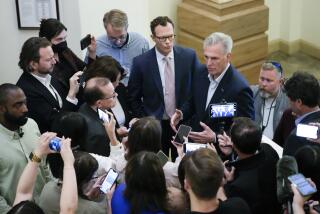U.S.-Japan Trade Talks Collapse on Eve of Deadline : Commerce: Negotiations were aimed at getting Tokyo to buy more medical and telecommunications equipment. Sanctions could come in 60 days.
- Share via
WASHINGTON — U.S. and Japanese officials failed in their last-minute negotiations Saturday to reach agreement on a major obstacle in the two nations’ rocky trade relationship, and a senior Clinton Administration official said the U.S. government will proceed toward imposing sanctions against Japan.
The Japanese negotiating team, which arrived here Thursday, decided to return to Tokyo today after its members and U.S. representatives were unable to make measurable headway in resolving the American complaint that Japanese government purchasing practices discriminate against imports, a Japanese official said.
The official said it was possible that the imposition of trade sanctions against Tokyo could lead to a further rupture in the negotiations, which are intended to open the lucrative Japanese market to foreign products.
Under a deadline set by the United States, the two countries had until today to reach an agreement that would lead to the Japanese government’s buying more foreign-made medical products and telecommunications equipment.
As a result of the failure to reach an agreement by the deadline, U.S. Trade Representative Mickey Kantor is expected to start the clock running on a 60-day period, after which sanctions would be announced, although they would not take effect until next year.
But built-in delays, beginning with this two-month consultation period, leave considerable time for the two sides to resume their negotiations, and any sanctions could be postponed, or called off, if progress is being made.
The 60-day period would conclude at the same time as another Sept. 30 deadline is reached. The second deadline, adding to the arsenal of economic weapons the United States can wield against Japan, comes under a trade provision--known as Super 301--that was reinstituted by the Administration in the wake of failed trade talks with Tokyo in February.
Under this provision, the United States lists countries given priority for trade investigations that could lead to the imposition of sanctions.
While such disruptions in the broad sphere of U.S.-Japanese negotiations have become common, the current fissure is occurring at a particularly difficult moment: The Japanese government--a new and unlikely coalition put together by the Socialists and the long-ruling Liberal Democrats--is still getting on its feet. (The Japanese shake-up led the United States to put off the original June 30 deadline for resolving the dispute.)
In addition, there has been little visible progress across the wide spectrum of trade frictions with Tokyo, and one of the measures of the relationship, the comparative value of the dollar and the yen, has been particularly unsteady in recent weeks, with the dollar falling to post-World War II lows.
The Japanese government’s market in medical and telecommunications equipment--in which the United States’ share is well behind its share in other foreign markets--is only one of several where the Administration has been trying to gain a foothold. In the so-called framework talks, intended to begin to put the trade relationship on a more even keel, efforts have also been ongoing to increase Japan’s purchases of foreign automobiles and auto parts, and to open the Japanese market to U.S. insurance companies.
The stumbling block Saturday was the same as it has been in other contentious negotiations between Washington and Tokyo over what the United States contends is a closed Japanese market: Neither side could agree on how to define, in actual practice, the phrase “objective criteria,” which has become a central element in the trade negotiations.
The United States is seeking some method to measure progress in opening Japan to foreign products and services, while Japan has remained insistent that it will not agree to numerical targets out of fear that failure to hit those targets will leave it open to punishing sanctions such as U.S. tariffs on imports from Japan.
“The meeting finished and no agreement was reached. There is still a wide gap,” said Seichi Kondo, an official with the Japanese Embassy. He said that while the two sides broke off the talks, the negotiators agreed to keep in touch and that Tokyo would be willing to resume the negotiations.
A Foreign Ministry official in Tokyo concurred. The official, speaking on condition of anonymity, reiterated that Japan will continue talks even if Washington begins proceedings to impose sanctions. “Japan, for its part, has set no deadline for the talks,” the official said.
But in diplomatic but firm language, embassy official Kondo made it clear that Japan is not likely to accept sanctions imposed by the United States without responding in some fashion.
If the United States “takes some measures that lead to unilateral sanctions, that is incompatible with the spirit of the framework talks,” he said.
Kondo said that because the imposition of U.S. sanctions remains “hypothetical,” he could not say specifically what action Tokyo would take. But he said, “We do reserve the right to withdraw from the framework talks.”
U.S. officials confirmed that the talks between Deputy U.S. Trade Representative Charlene Barshefsky and Japanese Deputy Foreign Minister Sadayuki Hayashi broke off late Saturday afternoon.
A senior Administration official, speaking on condition of anonymity, angrily denounced the Japanese for pushing the White House into conducting the latest round of negotiations--at the risk of falsely raising expectations of progress--while they demonstrated no willingness to compromise. “The bottom line is they came here with nothing. It’s unbelievable,” the official said.
Linking the failure of the talks to the uncertainty he said still envelops the new Japanese government, the official added, “No one’s in charge. They don’t negotiate at all, and the only thing they react to is pressure.”
Times staff writer David Holley contributed to this report from Tokyo.
More to Read
Inside the business of entertainment
The Wide Shot brings you news, analysis and insights on everything from streaming wars to production — and what it all means for the future.
You may occasionally receive promotional content from the Los Angeles Times.










